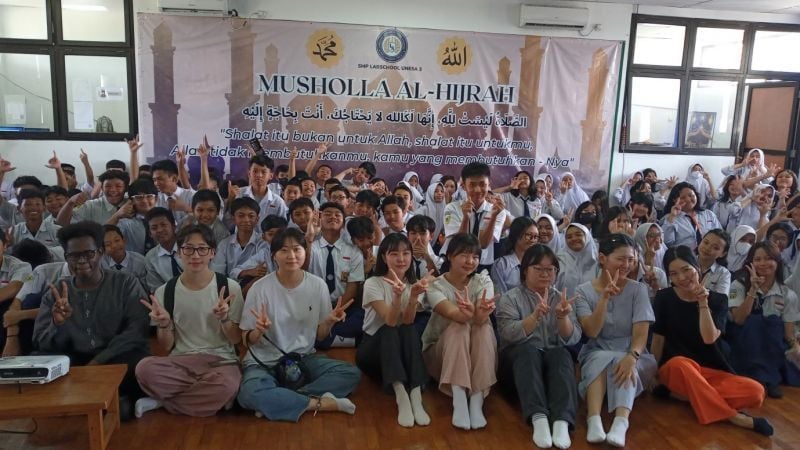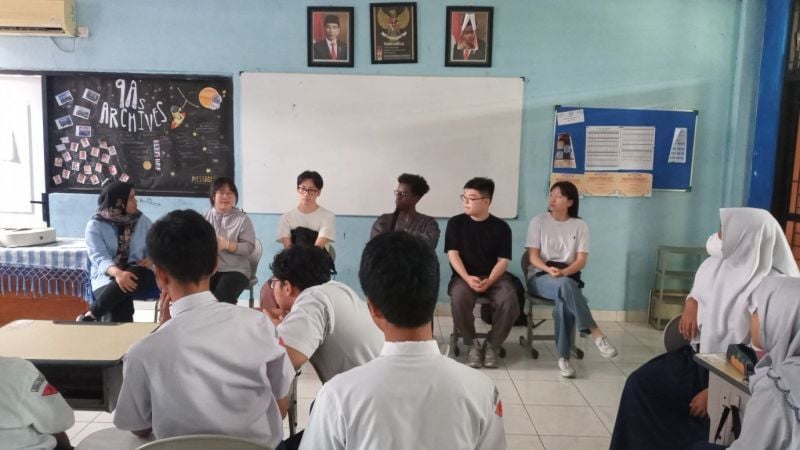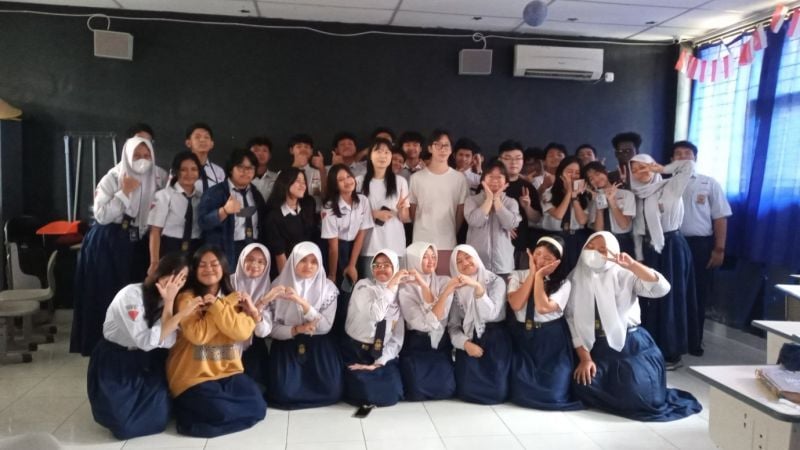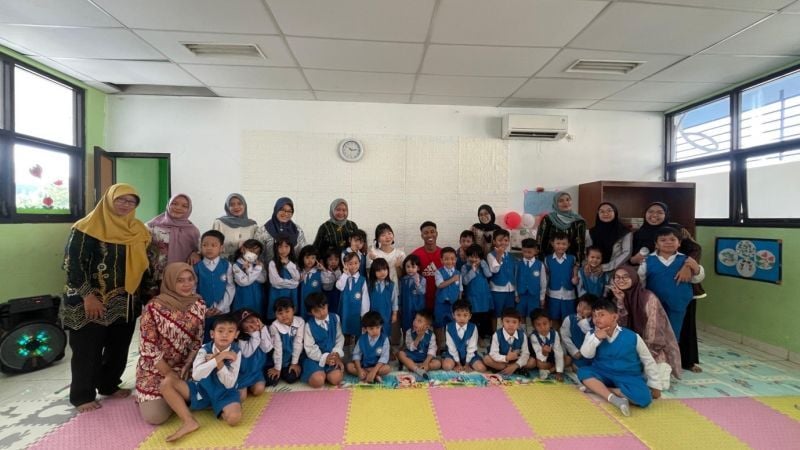
The excitement of BIPA Program International Students teaching and playing games with UNESA Lidah Wetan Labschool students.
Unesa. ac.id, SURABAYA—After being successfully implemented at the UNESA Ketintang Labschool, now international students of the Indonesian Language for Foreign Speakers (BIPA) program at Surabaya State University (UNESA) are teaching and sharing about the culture of their respective countries with UNESA Labschool students in Lidah Wetan, on Monday, May 27 2024.
The program, which has been running since a week ago, was welcomed happily and enthusiastically by Labschool kindergarten, elementary, middle and high school students. They were seen actively communicating and discussing with BIPA UNESA students. Not only that, the teachers were also enthusiastic in welcoming them to class.
Ari Nurdwiyanti, S.Pd., UNESA Labschool Kindergarten teacher, expressed his gratitude to the UNESA BIPA students from Korea and Madagascar who came to teach, tell stories, and invited the children to play language games happily.
“In class, the children were very happy to have people from other countries in their class. "They even fought to ask why the foreigner could speak Indonesian," he explained.
Funnily enough, the answer from the BIPA student from Korea tickled my stomach. "When children ask about those who can speak Indonesian, some say they can speak Indonesian because they like eating soto. "Of course the children were confused by the answer, so I accompanied and explained what the older students meant," he said.
He appreciated the new program from BIPA students. This activity is good, students can interact and exchange experiences. He hopes that this activity can continue at least once a year, this activity can also be seen by parents who accompany their children to study.

Students from various countries share their experiences learning languages and Indonesian culture at UNESA.
On the side On the other hand, Hapsari Dewi, S.Pd., Head of UNESA Labschool Elementary School, said that in class, BIPA students from Korea, Sudan and Japan told the children about their country first along with knowledge about the country's culture and others. Then, students from Japan taught them about making origami.
“Actually, this breakthrough program is good for children, there is knowledge gained from BIPA students. Children also enjoy learning and communicating with these students. However, in the future I hope that other things can be explored more, such as more two-way communication, because previously there was more one-way communication. "So, then the interaction can be really intense," he explained.
Another case, BIPA student activities at Labschool Middle School. BIPA students from China, Korea and Chad teach and share experiences and culture with each other in grades 7, 8 and 9.
This activity was held in two places, namely in class 9A and in the prayer room on the floor 2 Labschool Middle Schools for grades 7 and 8. In the prayer room, there were representatives of grades 7 and 8 who presented on 'Unity in Diversity' and they also played quizlet with BIPA students. Meanwhile, in class 9A, BIPA students and class 9A students discuss and communicate with each other about cultures in Indonesia.

The UNESA Labschool students are very enthusiastic about welcoming the teaching program which involves international students from BIPA UNESA.
Nariyatus Salamah , S.Pd., the teacher who accompanied during the teaching activities in class, explained that this activity was actually about how the students exchanged the daily culture of students and the culture of BIPA students in their respective countries. "We use the Jigsaw Reading method so that students are active and understand comprehensively about Indonesian cultures and the culture of BIPA students' countries," he said.
With this Jigsaw Reading method, he continued, teachers facilitate children to read texts simple and short related to culture that can be proud of, such as good manners, unique diversity, mutual cooperation, traditional ceremonies, and hospitality.
“From this activity, finally all students understood the five values in one discussion. BIPA students also followed the flow of the discussion. Each group has one BIPA student in it. Once finished, they returned to their respective groups and did a crossword puzzle about five Indonesian cultural values. "So, BIPA students must actively communicate and discuss with students to understand the puzzle," he explained.
Apart from activities in class and at the prayer room, BIPA students also carry out podcasts. Sukma (nickname), a student from Korea who participated in the podcast with two Labschool students, explained that this was the first time he participated in a podcast. For him, the students are very funny, and this could be a good experience for him who is learning Indonesian.

UNESA Labschool Kindergarten students also have the opportunity to learn and play with BIPA students.
Similarly felt by Almira and Alesiya, two class 9A students who participated in the podcast with Sukma. They enthusiastically and shouted back that this was a valuable first experience for them.
In the podcast they talked together about culture, different seasons, traditional food, traditional ceremonies of tribes in Indonesia and Korea. They also discussed Javanese and BIPA Unesa.
On the other hand, Ali, a BIPA student from Chad, South Africa who took part in class activities, expressed his joy. "Students here look very happy while we share, this is really an interesting experience for me and I am very happy to see the enthusiasm of the children during class."
Director of the UNESA Labschool Institute, Prof. Dr. Sujarwanto, M.Pd., said that the foreign student teaching program at UNESA Labschool was an important breakthrough in the internationalization of the Labschool program. With this program, students can learn and be involved in international conversations and share experiences with foreign students, whether related to culture or other interesting things.
For your information, BIPA students who took part in activities at Labschool today are as follows: Antsa comes from Madagascar, Yusra comes from Sudan, Momo comes from Japan. From Korea there are Joys, Centika, Putri, and Sukma. Xu Yuanyuan and Dimas are from China, and Ali is from Chad.[]
***
Reporter: Lina Lubabatul Karimah (FBS)
Editor: @zam*
Photo: Documentation of the Directorate of Public Relations and Public Information Team
Share It On:






